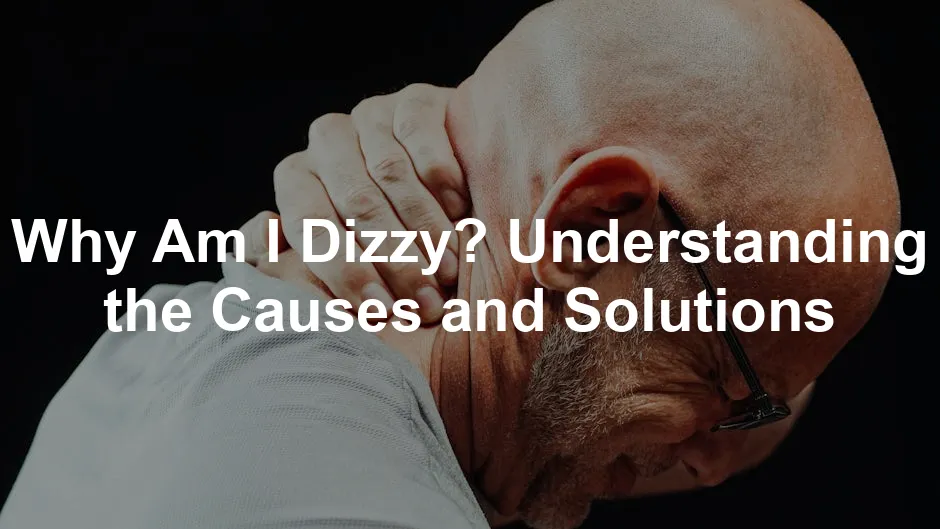
Why Am I Dizzy? Understanding the Causes and Solutions
Introduction
Feeling dizzy is common for many people. It can be unsettling and disruptive. Understanding what causes dizziness is crucial for knowing when to seek help. In this article, we’ll examine possible causes and offer insights on managing dizziness effectively.
To help you stay hydrated and combat those dizzy spells, consider investing in a Water Bottle with Time Marker. It’s a fun way to track your hydration goals and ensure you’re sipping throughout the day. Nobody wants to be the star of the next dehydration horror story!

Summary and Overview
Dizziness is a symptom rather than a condition on its own. It can manifest in various ways, such as feeling faint, unsteady, or spinning. Lightheadedness is often described as a sensation of faintness, while vertigo involves a feeling that you or your surroundings are in motion. Recognizing accompanying symptoms is vital. If dizziness occurs with severe headaches, confusion, or hearing loss, it may signal a serious health issue. Understanding your symptoms helps you respond appropriately and seek medical attention when necessary.
Speaking of dizziness, if you’re prone to motion sickness (and let’s be honest, who isn’t occasionally?), you may want to keep some Ginger Chews for Motion Sickness handy. They’re like little ginger-flavored lifesavers that can help ease those queasy feelings on your next trip!

Common Types of Dizziness
Lightheadedness vs. Vertigo
Lightheadedness and vertigo are distinct experiences. Lightheadedness feels like faintness or weakness. You might feel as though you might pass out. This can be triggered by dehydration, low blood sugar, or quick changes in posture. On the other hand, vertigo creates an illusion of movement. You may feel like you or your environment is spinning. Vertigo often stems from inner ear issues, such as Meniere’s disease or benign paroxysmal positional vertigo (BPPV). Knowing the difference between these sensations is essential for appropriate treatment and understanding your health.
Causes of Dizziness
Inner Ear Disorders
Inner ear disorders are common culprits behind dizziness. One prevalent condition is Benign Paroxysmal Positional Vertigo (BPPV). Here, tiny calcium particles dislodge in the inner ear, causing brief but intense episodes of spinning sensation. Symptoms often occur when tilting the head or changing positions. Treatment typically includes specific head movements or exercises, like the Epley maneuver, which can help reposition the particles.

Another condition is Meniere’s Disease, characterized by episodes of vertigo, ringing in the ears, and hearing loss. These episodes can last several hours. Treatment may involve dietary changes, such as reducing salt intake, and medications to manage symptoms.
Speaking of managing symptoms, a handy Epley Maneuver Instructional Guide can be a game-changer. It provides step-by-step instructions to help you perform the maneuvers correctly, making those dizzy spells a thing of the past!
Vestibular neuritis is another disorder that results from inflammation of the vestibular nerve, usually following a viral infection. This can lead to severe dizziness and nausea. While it often resolves on its own, medications can help alleviate the associated symptoms.
Cardiovascular Issues
Cardiovascular problems can also trigger feelings of dizziness. Conditions such as arrhythmias, where the heart beats irregularly, can lead to inadequate blood flow to the brain. This can create sensations of lightheadedness or faintness. If you notice palpitations along with dizziness, it’s crucial to consult a healthcare provider.

Low blood pressure, particularly postural hypotension, can cause dizziness when standing up quickly. This sudden drop can prevent sufficient blood flow to the brain, resulting in feelings of unsteadiness. Staying hydrated and standing up slowly can help mitigate these symptoms. If dizziness persists, it’s advisable to discuss it with your doctor to rule out any serious underlying issues.
Neurological Causes
Dizziness can signal various neurological conditions. Migraines are a common culprit. Often, they cause intense headaches but can also lead to dizziness without pain. This dizziness can feel like spinning or lightheadedness. If you experience these symptoms, it’s essential to seek medical advice.
Another serious condition is multiple sclerosis (MS). MS affects the central nervous system. Dizziness in MS may come with fatigue or vision problems. If you notice these accompanying symptoms, consult a healthcare professional.

Transient ischemic attacks (TIAs) are sometimes called “mini-strokes.” They can also cause sudden dizziness. This type of dizziness may occur with weakness, confusion, or difficulty speaking. If you notice these signs, seek medical help immediately.
Prompt attention to neurological symptoms is crucial. Ignoring them can lead to severe complications. Always listen to your body and act quickly if dizziness is accompanied by other concerning symptoms.
Medication Side Effects
Many medications can lead to dizziness as a side effect. Blood pressure medications are among the most common culprits. For instance, diuretics and ACE inhibitors can lower blood pressure too much and cause lightheadedness.
Certain antidepressants, like SSRIs, can also induce dizziness. As your body adjusts to these medications, you might feel unsteady or faint. It’s essential to monitor how you feel when starting a new medication.

If you experience dizziness after starting a new drug, consult your doctor. They may adjust your dosage or suggest alternatives. Always communicate any side effects with your healthcare provider to ensure your safety and well-being.
Other Common Triggers
Dizziness can arise from several everyday factors. Dehydration is a leading cause. When your body lacks fluids, blood pressure may drop, leading to feelings of lightheadedness. Make sure to drink enough water, especially during hot weather or after exercise.

To keep your hydration levels in check, try using Hydration Packs for Outdoor Activities. They’re perfect for keeping you hydrated while on the go, whether you’re hiking, biking, or just enjoying a sunny day!
Low blood sugar, or hypoglycemia, can also trigger dizziness. This often occurs if you’ve gone too long without eating. You might feel shaky or weak. A quick snack can help restore your energy.
Anxiety can create intense sensations of dizziness. When your body is under stress, it often responds with physical symptoms. You might experience rapid heartbeat and shallow breathing, contributing to feelings of unsteadiness.

If you’re dealing with anxiety, consider exploring a Relaxation Coloring Book. It’s a fun way to unwind and distract your mind from those dizzying thoughts!
Motion sickness is another common trigger. It happens when your inner ear senses movement that your eyes do not see, often while traveling. This disconnect can result in nausea and dizziness. If you know you’re prone to motion sickness, consider preventive measures like ginger candies or specific positioning in vehicles.
Lifestyle choices can also lead to dizziness. For instance, standing up too quickly can cause a sudden drop in blood pressure, leaving you feeling faint. If you regularly experience dizziness, pay attention to your daily habits. Small adjustments, like rising slowly from a seated position, can make a difference.

By being aware of these common triggers, you can take steps to prevent dizziness in your life. If dizziness persists, it’s essential to consult a healthcare professional for guidance.
Symptoms Associated with Dizziness
Recognizing Warning Signs
Dizziness often accompanies various symptoms. Nausea is a frequent partner, leading to an unsettling feeling. You might also experience vomiting, which can add to discomfort. Confusion is another common symptom. When you feel dizzy, your ability to think clearly may diminish temporarily.

Headaches can also arise alongside dizziness. These can range from mild to severe, affecting your overall well-being. If you notice these symptoms together, it’s crucial to monitor their intensity and duration.
Some signs might indicate a need for immediate medical attention. If dizziness comes with difficulty speaking, weakness, or numbness, it could signal a stroke or other serious condition. Similarly, chest pain or shortness of breath accompanying dizziness should prompt urgent medical evaluation.
Recognizing these symptoms can help you determine when to seek help. If dizziness becomes frequent or severe, don’t hesitate to consult a healthcare professional. Early intervention can be vital for addressing any underlying health issues.
Treatment and Management of Dizziness
Home Remedies and Self-Care Strategies
Feeling dizzy can be unsettling, but there are simple ways to manage it at home. First, stay hydrated. Drinking enough water throughout the day helps maintain healthy blood pressure. Dehydration is a common cause of dizziness, so keep that water bottle handy!

Rest is equally important. If you feel dizzy, lying down in a quiet, dark room can help. This allows your body to recover and minimizes the spinning sensation. Try to avoid sudden movements. When getting up from a sitting or lying position, do so slowly. This approach can prevent a sudden drop in blood pressure, which often leads to dizziness.
If your dizziness is frequent or severe, it’s wise to consult a healthcare provider. Be prepared to discuss your symptoms. Your doctor may ask about the frequency and duration of your episodes. They might also perform a physical exam or suggest tests like blood pressure monitoring or balance assessments to pinpoint the cause.

Consider keeping a Daily Planner for Stress Management to track your symptoms and triggers. This can help you identify patterns and take preventative measures!
In some cases, dizziness can signal a more serious condition. If you experience additional symptoms like severe headaches, chest pain, or difficulty speaking, seek medical help immediately. Understanding your body’s signals is crucial. While many cases of dizziness can be managed at home, professional guidance ensures you address any underlying issues effectively.
Conclusion
Understanding the reasons behind dizziness is essential for managing the symptom effectively. Often, dizziness is not serious and can be treated with home remedies. However, if you experience persistent or severe dizziness, it’s crucial to seek medical advice. Remember, most causes of dizziness are manageable with proper care and attention. You’re not alone in this; many people experience dizziness, and with the right strategies, it can often be controlled.
Anxiety can create intense sensations of dizziness, and understanding coping strategies is essential. why are coping strategies essential for handling anxiety in daily life
If you’re looking for a little extra comfort during those stressful moments, a Weighted Blanket for Relaxation could do wonders for your anxiety and help you drift off into a peaceful sleep.
Please let us know what you think about our content by leaving a comment down below!
Thank you for reading till here 🙂
Motion sickness is another common trigger for dizziness, especially while traveling. Why do we get motion sickness in cars or on boats
All images from Pexels




